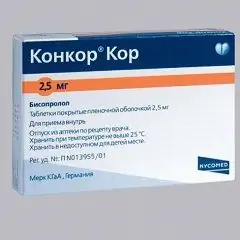- Author Rachel Wainwright wainwright@abchealthonline.com.
- Public 2023-12-15 07:39.
- Last modified 2025-11-02 20:14.
Concor Cor
Concor Cor: instructions for use and reviews
- 1. Release form and composition
- 2. Pharmacological properties
- 3. Indications for use
- 4. Contraindications
- 5. Method of application and dosage
- 6. Side effects
- 7. Overdose
- 8. Special instructions
- 9. Application during pregnancy and lactation
- 10. Use in childhood
- 11. In case of impaired renal function
- 12. For violations of liver function
- 13. Use in the elderly
- 14. Drug interactions
- 15. Analogs
- 16. Terms and conditions of storage
- 17. Terms of dispensing from pharmacies
- 18. Reviews
- 19. Price in pharmacies
Latin name: Concor Cor
ATX code: C07AB07
Active ingredient: bisoprolol (bisoprolol)
Producer: MERCK, KGaA (Germany)
Description and photo update: 2018-25-10
Prices in pharmacies: from 130 rubles.
Buy

Concor Cor is a selective beta 1 -adrenergic blocker.
Release form and composition
Concor Cor is produced in the form of film-coated tablets: white, heart-shaped, biconvex, a dividing line is applied on both sides (in blisters: 10 pcs., In a cardboard box 3, 5 or 10 blisters; 14 pcs., In a cardboard pack 1 blister; 25 pcs., in a cardboard box 1 or 2 blisters; 30 pcs., in a cardboard box 1 blister).
1 tablet contains:
- active substance: bisoprolol fumarate - 2.5 mg;
- auxiliary components: corn starch (fine powder), calcium hydrogen phosphate anhydrous, colloidal anhydrous silicon dioxide, crospovidone, magnesium stearate, microcrystalline cellulose;
- shell composition: macrogol 400, hypromellose 2910/15, titanium dioxide (E171), dimethicone 100.
Pharmacological properties
Pharmacodynamics
Concor Cor is a selective beta 1 -adrenergic blocker, has hypotensive, antianginal, antiarrhythmic effects. The active substance of the drug is bisoprolol, which has only selective activity to beta 1 -adrenergic receptors, which remains outside the therapeutic range. Lacking its own membrane-stabilizing effect and sympathomimetic activity, bisoprolol exhibits only a slight affinity for beta 2 -adrenergic receptors involved in the regulation of metabolism, and beta 2 -adrenergic receptors of vascular and bronchial smooth muscles. Therefore, bisoprolol has no effect on airway resistance and metabolic processes involving beta 2 -adrenoreceptors.
With ischemic heart disease (ischemic heart disease) without signs of chronic heart failure, a single dose of bisoprolol causes a decrease in heart rate (HR) and stroke volume, reducing the ejection fraction and myocardial oxygen demand. Long-term therapy leads to a decrease in the initially increased total peripheral vascular resistance (OPSS).
Pharmacokinetics
Almost complete (more than 90%) absorption of bisoprolol occurs in the gastrointestinal tract (GIT). After oral administration, its bioavailability is approximately 90% due to insignificant (about 10%) metabolism during the first passage through the liver. Simultaneous food intake has no effect on its bioavailability. The concentration of bisoprolol in blood plasma is proportional to the dose taken in the range of 5-20 mg. The level of maximum concentration in blood plasma is reached after 2-3 hours.
Plasma protein binding is approximately 30%.
The volume of distribution (V d) is 3.5 l / kg.
Bisoprolol is metabolized to a greater extent (about 95%) with the help of the CYP3A4 isoenzyme and to a small extent with the CYP2D6 isoenzyme. Metabolism occurs by oxidation without subsequent conjugation to form polar water-soluble metabolites that are excreted by the kidneys. The main metabolites of bisoprolol do not show pharmacological activity.
The total clearance of bisoprolol is 15 l / h. Through the kidneys, 50% of the drug is excreted unchanged and about 50% in the form of metabolites.
The half-life is 10-12 hours.
Indications for use
According to the instructions, Concor Cor is indicated for the treatment of chronic heart failure.
Contraindications
- cardiogenic shock;
- acute heart failure;
- chronic heart failure (CHF) in the stage of decompensation, which requires the use of inotropic therapy;
- sinoatrial blockade;
- atrioventricular (AV) block II - III degree in patients without a pacemaker;
- severe bradycardia with a heart rate of less than 60 beats per minute;
- sick sinus syndrome;
- severe arterial hypotension [systolic blood pressure (BP) below 100 mm Hg];
- Raynaud's syndrome or severe impaired peripheral arterial circulation;
- severe form of bronchial asthma;
- chronic obstructive pulmonary disease in severe form;
- metabolic acidosis;
- pheochromocytoma (without the simultaneous administration of alpha-blockers);
- age up to 18 years;
- period of breastfeeding;
- hypersensitivity to the components of the drug.
Caution should be exercised when prescribing Concor Cora to patients on desensitizing therapy, with degree I AV block, restrictive cardiomyopathy, congenital heart disease, heart valve disease with severe hemodynamic disturbances, CHF with myocardial infarction in the last 3 months, hyperthyroidism, Prinzmetal's angina, renal failure with creatinine clearance (CC) less than 20 ml / min, type I diabetes mellitus, diabetes mellitus with significant fluctuations in blood glucose concentration, psoriasis (including history), severe liver dysfunction, patients on a strict diet.
During pregnancy, the appointment of Concor Cora is possible only in an exceptional case, when, according to the doctor, the expected benefit from therapy for the mother is much higher than the potential risk of side effects in the fetus.
Instructions for use Concor Bark: method and dosage
Concor Cor tablets are taken orally, once a day in the morning (before, during or after breakfast), swallowing whole and drinking plenty of liquid.
A prerequisite for the appointment of Concor Cor is the absence of signs of exacerbation of stable CHF.
You should start taking the tablets in strict accordance with the individual titration scheme. When titrating, the tolerance of the drug is taken into account, therefore, the dose can be increased only if the previous dose is well tolerated.
During the titration period, the patient should be provided with regular monitoring of heart rate, blood pressure, and the severity of CHF symptoms, the aggravation of which is possible after taking the first dose of the drug.
Recommended dosage of Concor Bark: initial dose - 1.25 mg (1/2 tablet) once a day. Then, with good tolerance to each previous dose, it can be increased step by step by 1.25 mg (up to 2.5 mg, 3.75 mg, 5 mg, 7.5 mg and 10 mg) with an interval of 14 days. In case of poor tolerance of the current dose of the drug, it should be reduced to the previous dose. The maximum daily dose is 10 mg.
CHF treatment is carried out according to the standard scheme, which includes beta-blockers, angiotensin-converting enzyme (ACE) inhibitors or angiotensin II receptor antagonists (with intolerance to ACE inhibitors), diuretics, cardiac glycosides.
In case of deterioration of the course of CHF during or after the titration phase, which is manifested by arterial hypotension or bradycardia, it is first of all recommended to adjust the doses of concomitant therapy. In addition, it is possible to temporarily reduce the dose of Concor Cora, or to cancel it. After the patient's condition has stabilized, treatment is continued or resumed.
The duration of treatment assumes long-term therapy.
Increasing the dose for mild, moderate and severe renal or liver dysfunction should be carried out under strict medical supervision. Dose adjustment for these categories of patients is usually not required. In severe liver disease and CC less than 20 ml / min in patients with impaired renal function, the maximum daily dose may be 10 mg.
Elderly patients do not need dose adjustment of Concor Cortex.
Side effects
- on the part of the cardiovascular system: very often - bradycardia; often - a feeling of numbness or coldness in the extremities, a pronounced decrease in blood pressure, aggravation of symptoms of the course of CHF; infrequently - orthostatic hypotension, violation of AV conduction;
- from the central nervous system: often - headache, dizziness; rarely - loss of consciousness;
- mental disorders: infrequently - insomnia, depression; rarely - nightmares, hallucinations;
- from the digestive system: often - nausea, vomiting, constipation, diarrhea; rarely - hepatitis;
- from the organ of hearing: rarely - hearing impairment;
- on the part of the organ of vision: rarely - a decrease in lacrimal secretion; very rarely - conjunctivitis;
- on the part of the respiratory system: infrequently - bronchospasm (if a history of bronchial asthma or airway obstruction is indicated); rarely - allergic rhinitis;
- from the musculoskeletal system: infrequently - muscle cramps, muscle weakness;
- from the reproductive system: rarely - violation of potency;
- dermatological reactions: rarely - hypersensitivity reactions (itching, rash, hyperemia); very rarely - alopecia; with psoriasis - possible exacerbation of symptoms of the course of the disease, psoriasis-like rash;
- laboratory parameters: rarely - an increase in the concentration of triglycerides, the activity of liver enzymes in the blood plasma (alanine aminotransferase and aspartate aminotransferase);
- general disorders: often - increased fatigue, asthenia.
Overdose
Symptoms: pronounced decrease in blood pressure, bronchospasm, AV block, severe bradycardia, acute heart failure, hypoglycemia. Patients with CHF have the highest degree of sensitivity to a single high dose of bisoprolol.
Treatment: the use of supportive symptomatic therapy. With a significant decrease in blood pressure, it is necessary to intravenously (intravenously) inject plasma-substituting solutions and vasopressor agents. With bronchospasm, the patient is prescribed bronchodilators, including beta 2-adrenomimetics and / or aminophylline. With AV blockade, careful monitoring of the patient's condition is required, the appointment of epinephrine or another beta-adrenergic agonist, if necessary, the use of an artificial heart rate driver. With severe bradycardia, intravenous atropine is prescribed, in the absence of a sufficient therapeutic effect, it is recommended to carefully administer a drug with a positive chronotropic effect. Temporary installation of a pacemaker is possible. In the case of exacerbation of CHF, intravenous administration of drugs with a positive inotropic effect, diuretics, vasodilators is indicated. With the development of hypoglycemia, a dextrose (glucose) solution is administered intravenously.
special instructions
When prescribing the drug, the doctor should warn the patient that it is possible to change the recommended dose or stop using Concor Cora only after his consultation.
Cancellation of the drug should be carried out by gradually reducing the dose used, since abrupt cessation of therapy can lead to a deterioration in heart function, especially in patients with ischemic disease.
The effect of bisoprolol and its tolerance can be influenced by the simultaneous administration of any other drugs, even over-the-counter drugs, so it is not recommended to take other drugs without consulting a doctor.
When using contact lenses, the possible reduction in tear fluid during therapy should be considered.
In patients with bronchial asthma or chronic obstructive pulmonary disease, the use of Concor Cortex is possible only when combined with bronchodilating agents. In bronchial asthma, there is a risk of increased airway resistance, which may require the appointment of a higher dose of beta 2 -adrenomimetics.
It is necessary to use pills with caution in diabetes mellitus with significant fluctuations in the level of glucose in the blood, since the drug can mask symptoms of hypoglycemia such as tachycardia, excessive sweating, palpitations.
When prescribing a planned surgical intervention with the use of general anesthesia drugs, you should start discontinuing the drug in advance, so that its completion occurs 48 hours before the start of anesthesia. The anesthesiologist must be informed that the patient was on Concor Corom therapy.
Consideration should be given to the weakening of adrenergic compensatory regulation against the background of the action of beta-blockers, which may result in an increased sensitivity of the patient to allergens and the development of severe anaphylactic reactions. In this case, treatment with adrenaline (epinephrine) may not have the expected therapeutic efficacy.
With pheochromocytoma, the appointment of Concor Cortex is possible only while taking alpha-blockers.
Treatment with bisoprolol can mask the symptoms of hyperthyroidism.
Influence on the ability to drive vehicles and complex mechanisms
During the period of application of Concor Cortex, the patient's ability to drive vehicles and complex mechanisms is not impaired. However, it is recommended to be careful at the beginning of therapy, after another dose change or while drinking alcohol, since individual disorders of psychomotor reactions are possible.
Application during pregnancy and lactation
The use of Conkor Bark during gestation is possible in special cases, when the intended effect of therapy for the mother exceeds the potential threat of side effects in the fetus.
Since beta-blockers reduce blood flow in the placenta, which can affect the development of the fetus, treatment should be accompanied by careful monitoring of blood flow in the placenta and uterus, growth and development of the fetus. If adverse events develop, alternative treatments are required. After birth, the newborn should be carefully examined because of the risk of developing symptoms of bradycardia and hypoglycemia during the first three days of life.
The appointment of the drug during lactation is contraindicated, therefore, if it is necessary to use Concor Cora 2.5 mg, breastfeeding should be discontinued.
Pediatric use
The appointment of Kokor Cora for the treatment of children under the age of 18 is contraindicated due to insufficient data on the use of the drug in this category of patients.
With impaired renal function
Concor Cor should be prescribed with caution in patients with severe renal failure (CC less than 20 ml / min).
Increasing the dose with mild, moderate and severe renal dysfunction should be accompanied by strict medical supervision. No dose adjustment is usually required. The maximum daily dose may be 10 mg.
For violations of liver function
Concor Cor should be prescribed with caution in patients with severe liver disease.
With an increase in the dose in patients with mild, moderate and severe liver dysfunction, it is necessary to carefully monitor the patient's condition. No dose adjustment is usually required. For severe liver disease, the maximum daily dose may be 10 mg.
Use in the elderly
For elderly patients, dose adjustment is not required.
Drug interactions
It is not recommended to use the following combinations with Concor Cor:
- verapamil, diltiazem - can reduce myocardial contractility and disrupt AV conduction;
- quinidine, disopyramide, phenytoin, flecainide, lidocaine, propafenone and other class I antiarrhythmics - can cause a decrease in AV conduction and cardiac contractility;
- clonidine, methyldopa, rilmenidine, moxonidine and other antihypertensive drugs of central action - can lead to a decrease in heart rate and cardiac output, to vasodilation against the background of a decrease in the central sympathetic tone; their abrupt withdrawal, especially before the withdrawal of bisoprolol, increases the risk of developing rebound arterial hypertension.
With the simultaneous use of Concor Cora:
- amiodarone and other class III antiarrhythmics can cause increased AV conduction disorders;
- blockers of slow calcium channels, dihydropyridine derivatives (including nifedipine, amlodipine, felodipine) may increase the risk of arterial hypotension; in patients with CHF, there is a high probability of subsequent deterioration of the contractile function of the heart;
- beta-blockers for topical use (including eye drops for the treatment of glaucoma) can enhance the systemic effect of bisoprolol (lowering blood pressure, lowering heart rate);
- hypoglycemic agents for oral administration, insulin can enhance its effect, mask or suppress signs of hypoglycemia, including tachycardia;
- parasympathomimetics can increase the risk of developing bradycardia, increase the violation of AV conduction;
- means for general anesthesia increase the likelihood of cardiodepressant action, arterial hypotension;
- non-steroidal anti-inflammatory drugs can reduce the antihypertensive effect of the drug;
- cardiac glycosides can cause an increase in pulse conduction time, increasing the risk of developing bradycardia;
- beta-agonists, including isoprenaline and dobutamine, may reduce the effect of each drug;
- antihypertensive drugs, phenothiazines, barbiturates, tricyclic antidepressants can increase the hypotensive effect of bisoprolol;
- norepinephrine, epinephrine (adrenergic agonists that affect alpha and beta adrenergic receptors) can enhance their vasoconstrictor action, causing an increase in blood pressure;
- mefloquine increases the risk of developing bradycardia;
- MAO monoamine oxidase inhibitors (except type B) increase the hypotensive effect of beta-blockers, increase the risk of developing a hypertensive crisis.
Analogs
Analogues of Concor Cora are: Concor, Bikard, Bisoprolol Krka, Bisoprofar, Bisoprolol-Richter, Dorez, Coronal.
Terms and conditions of storage
Keep out of the reach of children.
Store at temperatures up to 25 ° C.
The shelf life is 3 years.
Terms of dispensing from pharmacies
Dispensed by prescription.
Reviews about Concor Kore
Reviews about Concor Kore are mostly positive. Patients who have approached the drug indicate its effectiveness in the treatment of tachycardia. Taking pills well stabilizes the heart rate, promotes a mild decrease in blood pressure.
The disadvantages of the drug, many patients include a large list of contraindications and the risk of side effects.
Price for Concor Cor in pharmacies
The price of Concor Cor 2.5 mg per pack containing 30 tablets can be about 168 rubles.
Concor Cor: prices in online pharmacies
|
Drug name Price Pharmacy |
|
Concor Cor 2.5 mg film-coated tablets 30 pcs. 130 RUB Buy |
|
Concor cor tablets p.p. 2.5mg 30 pcs. 151 RUB Buy |
|
Concor KOR tablets p.p. 2.5mg 30 pcs. 156 r Buy |

Anna Kozlova Medical journalist About the author
Education: Rostov State Medical University, specialty "General Medicine".
Information about the drug is generalized, provided for informational purposes only and does not replace the official instructions. Self-medication is hazardous to health!






